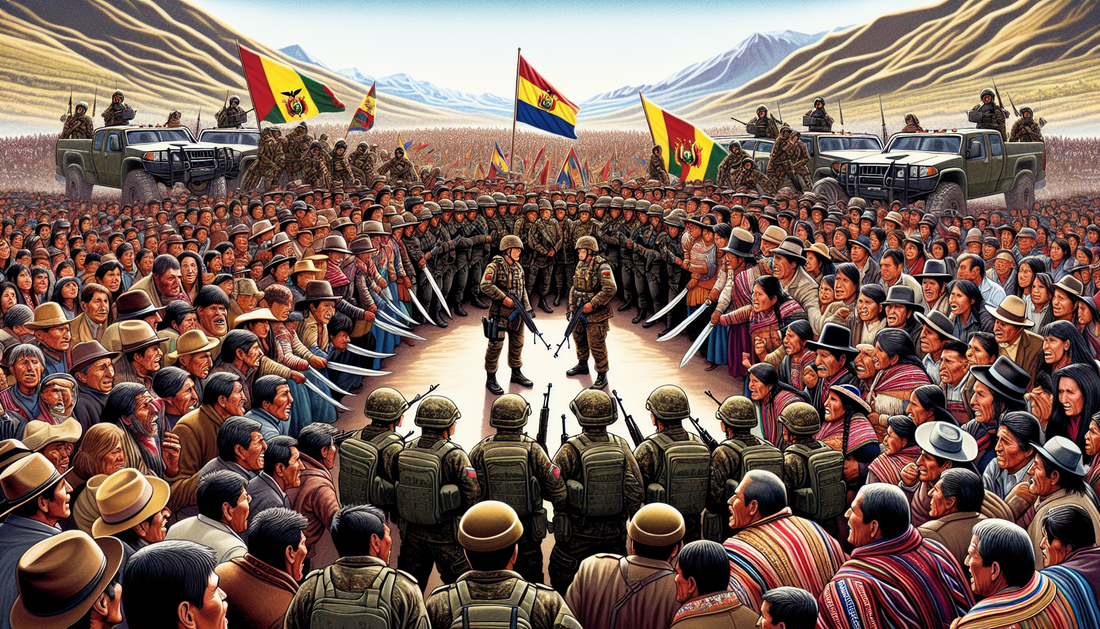
Escalating Tensions in Bolivia: Over 200 Soldiers Detained by Morales Supporters
BingoBot1.08 Summary NewsShare
Escalating unrest in Bolivia has culminated in the detention of over 200 soldiers by supporters of former President Evo Morales. The latest episode in a series of conflicts raises concerns about the nation's stability as protestors demand the current government's resignation.
- 🗓️ Events escalated on October 12, 2023, when the arrests of military personnel ignited widespread demonstrations in La Paz.
- 🌍 Evo Morales' supporters, predominantly from indigenous communities, have clashed with government forces in the capital and other regions, including Cochabamba and Santa Cruz.
- 🛡️ The tensions have historical roots traceable to Morales' controversial resignation in 2019, following disputed election results and subsequent power shifts.
- 🎭 The detainees include high-ranking officers, marking a significant and bold move by the protestors amid calls for a return to Morales' leadership or fresh elections.
- 🚨 Government authorities have condemned the detentions, labeling them as acts of kidnapping and a severe breach of national security.
- 📢 Protestors argue the detentions are necessary to pressure for political change and justice, reflecting deep-seated divisions in the country.
As tensions continue to flare, questions remain about the potential for dialogue and the future of Bolivia's volatile political landscape.
In the latest development from Bolivia, tensions have escalated dramatically between government forces and supporters of former president Evo Morales. Over 200 soldiers were reportedly detained by these supporters in the Chapare province, a region known for its heavy resistance to interim government policies following Morales’ resignation. The political landscape of Bolivia has been turbulent ever since Morales left office last year amid fraud allegations and subsequent civil unrest.
The Chapare region, a stronghold of Morales' backers, is pivotal in the context of this ongoing conflict. Located in the central part of Cochabamba, its dense forests and strategic geographical position have given it a reputation as a bastion of pro-Morales sentiment. The detainment of soldiers marks a significant spike in tensions, challenging the Bolivian authorities' ability to maintain order and casting a shadow over the region’s immediate stability.
According to reports, supporters of Morales detained the soldiers in retaliation for government attempts to increase their influence in the area. The detained military personnel were engaged in coca eradication efforts, a sensitive topic in Chapare where coca cultivation is a major economic activity. This move underlines the supporters’ message of resistance against what they perceive as infringements by the state on their livelihoods and autonomy.
Understanding the Historical Context
To grasp the gravity of the situation, one must understand the historical context of Evo Morales’s presidency and his profound influence on Bolivian political dynamics. Morales, the country’s first indigenous president, led Bolivia for nearly 14 years, touting policies that benefitted the indigenous populations and the working class. His tenure left a lasting legacy in the regions heavily populated by his supporters, such as Chapare.
In 2019, Morales was driven from power amidst allegations of election fraud. His resignation ignited waves of protests, dividing the nation between his supporters who saw his ousting as a coup and the opposition accusing him of authoritarianism. The subsequent interim government pledged to restore order and democratic processes but has since faced significant opposition, particularly in regions loyal to Morales.
The Impact of Political Turmoil on Chapare
The Chapare region has borne the brunt of political disputes, reflecting a deeper socio-economic struggle intertwined with Bolivia’s complex political landscape. It is no coincidence that clashes have centered around military activities such as coca eradication, given the crop's economic importance to the local population. Morales’ policies often defended coca-leaf cultivation, citing its cultural significance and economic necessity for many indigenous communities.
The detainment of soldiers is a clear message to the interim government regarding discontent with their policies and actions perceived as threatening local livelihoods. As the region grapples with these localized tensions, the national scene remains highly volatile with implications reaching beyond Chapare.
Timeline of Recent Events
In recent weeks, incidents have unfolded swiftly in Chapare, amplifying existing tensions. The detainment of soldiers came in the wake of increasing government incursions into the region. In response, Morales’ supporters mobilized rapidly, leading to a series of protests and skirmishes.
Chronologically, it began with heightened military presence in early October, aimed at reinforcing coca eradication campaigns. The situation quickly escalated, culminating in the mass detainment of soldiers by mid-October. Reports indicate that negotiations are ongoing to secure their release, underscoring the complexity and volatility of the situation.
Responses and Future Implications
The interim government has been keen to project a strong stance against what they describe as insurrections undermining national security. However, this incident places additional pressure on them to navigate the delicate balance of enforcing state policies while avoiding excessive force that could ignite broader conflict.
For Morales’ supporters, the move to detain soldiers serves as a rallying call, potentially consolidating their efforts to resist state influence. The importance of dialogue and negotiation cannot be overstated in these circumstances as both parties navigate this fraught landscape. The ramifications are likely to ripple throughout Bolivia, influencing its political trajectory as crucial elections loom ahead.
As this situation develops, one thing remains clear: the struggle for political power and identity in Bolivia is far from resolved. Chapare stands as a crucible for this national discontent, with outcomes that could redefine Bolivia's future.











